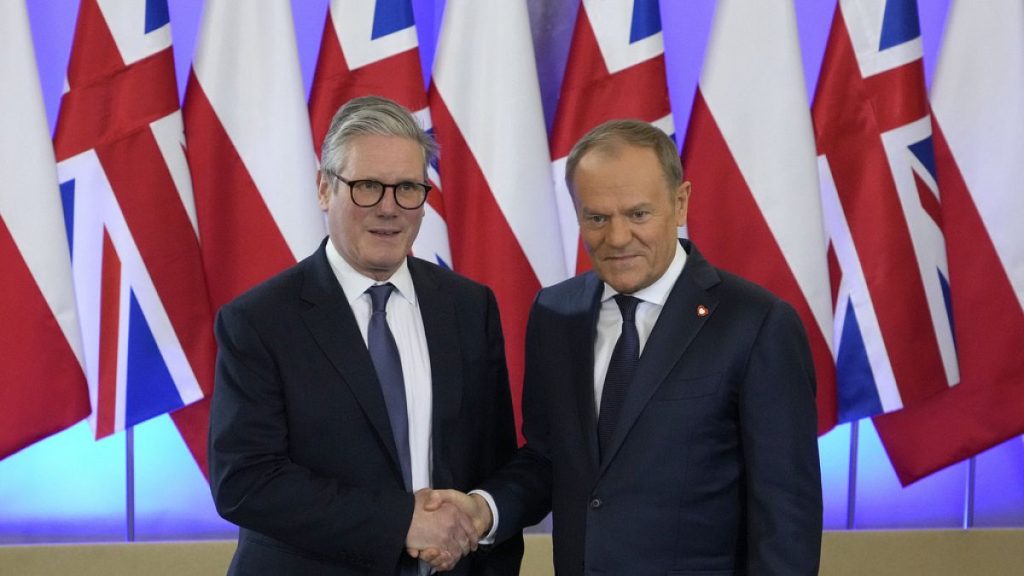Keir Starmer, the British Prime Minister, embarked on a significant diplomatic mission to Poland following a visit to Ukraine, where he conferred with President Volodymyr Zelenskyy. The primary focus of Starmer’s visit to Poland was to strengthen bilateral ties, particularly in the realms of defense and security cooperation, and to reaffirm the UK’s commitment to supporting Ukraine amidst ongoing geopolitical tensions. His meeting with Polish Prime Minister Donald Tusk served as a platform to discuss key issues, including NATO cooperation, migration challenges, and the evolving security landscape in Europe. The visit underscored the importance of the UK-Poland partnership in addressing regional stability and bolstering collective defense capabilities within the NATO framework.
A central outcome of the meeting between Starmer and Tusk was the announcement of a forthcoming bilateral security and defense cooperation agreement, slated to be signed later in the year. This agreement symbolizes a deepening commitment between the two nations to collaborate on defense initiatives and enhance interoperability. Specifically, Starmer highlighted a joint program office being established in Bristol, UK, dedicated to a £4 billion partnership for developing next-generation air defense systems for Poland. This initiative underscores the UK’s commitment to bolstering Poland’s defense capabilities and strengthening regional security against potential threats. Furthermore, the leaders emphasized their shared commitment to tightening cooperation in the strategically vital Baltic and North Seas, recognizing the importance of maintaining stability and maritime security in these regions.
Beyond bilateral defense cooperation, the discussions between Starmer and Tusk also encompassed broader European security concerns, including the ongoing situation in Ukraine and the challenges posed by migration. The leaders reaffirmed their commitment to continued support for Ukraine and explored ways to further strengthen their collaborative efforts in providing assistance. The issue of migration, a complex and multifaceted challenge facing Europe, was also a key topic of discussion. This underscores the importance of finding effective solutions to manage migration flows while upholding humanitarian principles. Furthermore, Tusk took the opportunity to brief Starmer on the priorities of the Polish presidency of the Council of the European Union, highlighting the areas where Poland seeks to exert its influence and advance its agenda within the EU framework.
In a deeply personal and poignant moment during his visit to Poland, Starmer visited the Auschwitz-Birkenau Memorial and Museum, the site of the horrific Nazi German extermination camp. The visit profoundly impacted the Prime Minister, who expressed his “sheer horror” at the atrocities committed during the Holocaust. He described the experience as “utterly harrowing,” reflecting on the immense suffering and loss of life that occurred within the camp’s walls. Starmer’s visit to Auschwitz served as a stark reminder of the dangers of hatred and intolerance and underscored the importance of remembering the victims of the Holocaust. The visit also took on added significance in the context of the recent escalation of conflict in the Middle East and the rise in antisemitic incidents globally.
In the aftermath of the Hamas attack on Israel and the ensuing conflict in Gaza, there has been a documented increase in antisemitic incidents worldwide. Starmer’s visit to Auschwitz and his subsequent statements condemning antisemitism took place against this backdrop of heightened tensions and concerns within Jewish communities globally, including in Britain. He vowed to combat the growing antisemitism and emphasized the need to stand in solidarity with Jewish communities facing fear and intimidation. This commitment to addressing antisemitism is particularly relevant given past criticisms faced by Starmer’s own Labour Party regarding allegations of antisemitism within its ranks.
Under Jeremy Corbyn, Starmer’s predecessor, the Labour Party faced accusations of failing to adequately address antisemitism within its ranks. A 2020 report by the UK’s Equality and Human Rights Commission found instances of harassment and discrimination, further intensifying concerns about antisemitism within the party. Starmer’s visit to Auschwitz and his strong condemnation of antisemitism can be interpreted as an attempt to distance himself from the party’s past controversies and reaffirm his commitment to fighting all forms of discrimination. This underscores the ongoing challenges faced by political leaders in addressing complex social issues and ensuring that their parties uphold principles of inclusivity and tolerance. It also highlights the importance of learning from past mistakes and taking proactive steps to combat prejudice and hatred.














